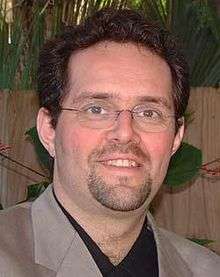Frédéric Artru
| Frédéric Artru | |
|---|---|
 Frédéric Artru | |
| Born |
October 7, 1969 Pau, France |
| Nationality | French |
| Education | (ENST) |
| Occupation | Investment Banker and Entrepreneur |
Frédéric Artru (born October 7, 1969) is a French entrepreneur born in Pau, France. He is best known for his work as co-author of the Versit CTI Encyclopedia and the specifications of Versit's protocols as well as the founder of Odisei, a French-based software company that achieved the highest return on investment on a time-basis for a French-based technology company (50 to 1 ROI for seed investors). Most recently he has been active in technology and investment ventures in the telecommunications industry.
Versit
Frédéric Artru was brought into the Versit Consortium in January 1995 as protocol and communications architecture expert. He joined Michael Bayer at Apple Computer, Inc. as part of the Versit CTI Encyclopedia (VCTIE) team. The Versit CTI Encyclopedia is a 3,000-page, 6 volume set of specifications defining how computer and telephony systems are to interact and become interoperable. Frédéric was specifically responsible for defining, writing, validating and implementing the three CTI Protocols (one was based on ECMA's CTI specifications, one on Novell/Lucent TSAPI and the third was designed by Frédéric Artru to support small footprint devices such as cellphones.
These specifications are now industry standards as part of the ECMA, ECTF as well as ITU telephony standards. While at Apple Computer, Frédéric also held several senior engineering positions related to communication architectures for existing and future Macintosh operating systems.
Odisei
In 1998, Frédéric returned to France and founded Odisei, a Sophia-Antipolis based startup developing the world’s first hosted iPBX technology.[1] Frédéric funded Odisei through a round of business angels to sustain a team of 10 developers for 18 months. Frédéric based the iPBX technology on the Versit CTI Encyclopedia, which he co-authored while at Apple Computer, providing technical direction in cooperation with Odisei’s Director of development.
Frédéric then recruited Odisei’s vice-president of sales and marketing and secured two VoIP customer-premises equipment strategic partners, 8x8 and Calista (later acquired by Cisco). At the Voice on the Net trade show in March 1999, Frédéric demonstrated Odisei’s technology to major telecom players, showing that Odisei was ahead of competitors like NetSpeak, Clarent or Tundo. Based on its success, Odisei started merger discussions with partner 8x8. Frédéric oversaw the negotiation process and two months later, successfully closed an acquisition deal[2][3] for a stock exchange valued at $14M, providing a 22 to 1 return on investment for the group of business angels and a 50 to 1 for seed investors, believed to be the highest return on investment on a time-basis for a French-based technology company.
SigEx Ventures
In 2000, Frédéric Artru launches with partner Chris Cantell a series of technology and investment ventures aimed at shaping the new telecommunications industry, in great crisis at the time. In 2002, Frédéric Artru publishes the article "The Future of Media"[4] in French[5] in "La Revue Télécom",[6] a specialized French magazine for telecom specialists. In this article, he lays the ground for what he calls at the time Enhanced Communications. This article defines, more than four years prior, the advent of YouTube, Skype, Facebook, Joist and other content driven concepts existing today.
Enhanced Communications companies are financially supported by SigEx Ventures, Inc., a US private investment fund, incorporated in 2001, focused on seed financing of technology ventures related to Enhanced Communications.
SigEx Telecom
In July 2002, Chris Cantell and Frédéric Artru incorporate SigEx SuperPBX, SAS, a French technology company that builds the core architecture (called SuperPBX) of a next generation telecommunications carrier. SigEx SuperPBX is funded by private investors as well as Chris Cantell and Frédéric Artru's SigEx Ventures. The commercial name is SigEx SuperPBX is now SigEx Telecom. In March 2004, Chris Cantell and Frédéric Artru incorporate privately funded Sigex Ventures Euro Fund, SAS, a French investment vehicle for telecommunications technology ventures.
The Foundry School
In 2003, Frédéric Artru engages into a European site selection to start a leadership school called The Foundry School.[7] In parallel to this site selection, Chris Cantell promotes a European "Be a Part of It" tour in major cities considered for the site. With great media coverage and a final selection of a main site in Pau, France,[8] Chris Cantell renews a successful training program that he had initiated four years prior in Montreal, Quebec.
References
- ↑ "Odisei est spécialisée dans la téléphonie sur Internet.". Les Echos. November 25, 1998. Frédéric Artru launches Odisei in Sophia-Antipolis.
- ↑ "8x8 offre 70 millions de francs pour Odisei". Les Echos. May 21, 1999. 8x8 acquires Odisei.
- ↑ "LES 100 QUI FONT BOUGER NICE". L'Express. June 6, 2000. Nice top 100 business movers.
- ↑ "The Future of Media" (PDF). la Revue Télécom. January 2002. Frédéric Artru's article on the Future of Media (English translated version).
- ↑ "Le Futur des Médias" (PDF). la Revue Télécom. January 2002. Frédéric Artru's article on the Future of Media as it appeared in the "La Revue Télécom" publication (French published version).
- ↑ "La Revue Télécom". Specialized publications for French telecom industry.
- ↑ "Le Rambo des télécoms". Le Point.fr. October 18, 2002. Frédéric Artru launches the Foundry initiative with partner Chris Cantell.
- ↑ "Pau - Vivre à très haut débit". Le Point.fr. October 1, 2003. Chris Cantell and Frédéric Artru choose Pau for the first French Foundry.
External links
- Frédéric Artru's French blog relating to Wealth Management, Innovation and Growth
- CompTIA ECTF group - Repository of the Versit CTI Encyclopedia
- CT Plug & Play site from Michael Bayer